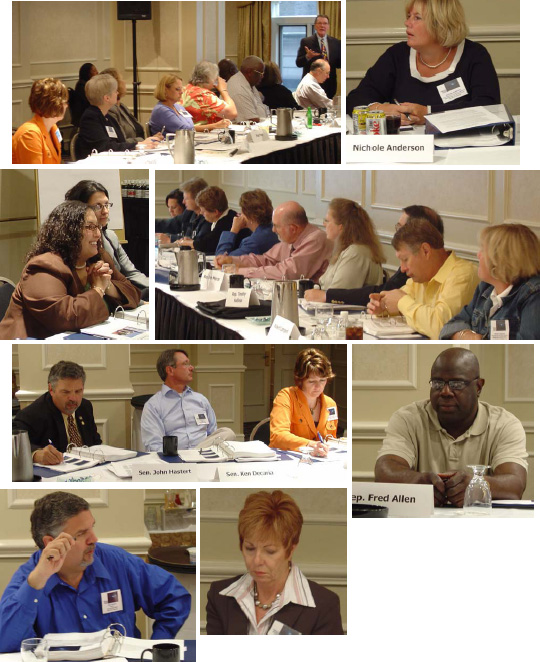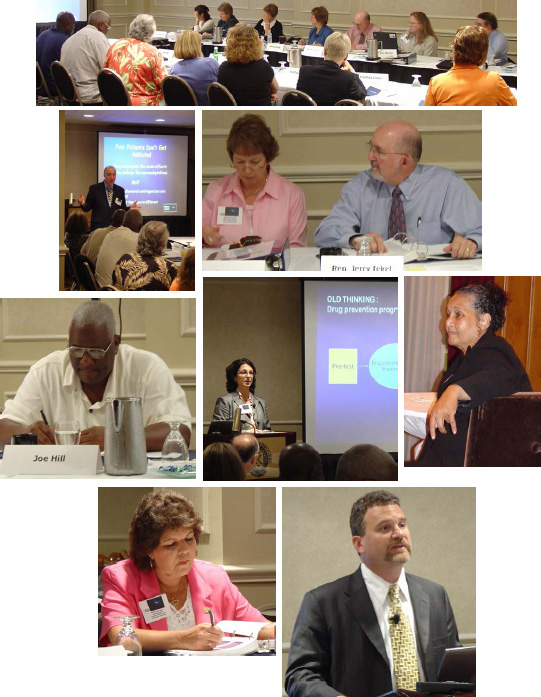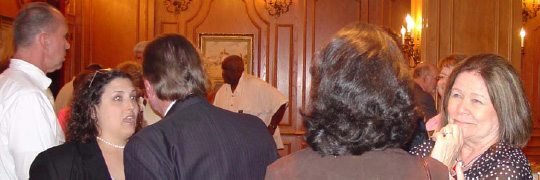Arkansas Team
Pam Adcock
Representative
Arkansas State House
Fred Allen
Representative
Arkansas State House
Cynthia Crone
Director of Family Treatment
Consultation
UAMS Partners for Inclusive Communities
University of Arkansas for Medical Science
Fran Flener
Arkansas Drug Director
Division of Behavioral Health Services
Office of Alcohol and Drug Abuse Prevention
Joe M. Hill
Director, Division of Behavioral Health
Office of Alcohol and Drug Abuse Prevention
Pat Page
Director
Division of Children and Family Services
Tracy Pennartz
Representative
Arkansas State House
Sandra Prater
Representative
Arkansas State House
Robert Thompson
Senator
Arkansas State Senate
Henry “Hank” Wilkins, IV
Senator
Arkansas State Senate
|
|
Wyoming Team
Pat Aullman
Senator
Wyoming State Senate
Nichole Anderson
Asst. Deputy Director for Policy & Legislation
Wyoming Department of Family Services
Wendy Curran
Office of the Governor
Ken Decaria
Senator
Wyoming State Senate
Mary Flanderka
Administrator, Community Based Programs
Wyoming Department of Health
Timothy P. Hallinan, M.D.
Representative
Wyoming State House
John Hastert
Senator
Wyoming Sate Senate
Jerry Iekel
Representative
Wyoming House of Representatives
Robert O. Lampert
Director
Wyoming Department of Corrections
Erin Mercer
Representative
Wyoming State House
Lisa Osvold
Deputy Director Workforce Services
Korin Schmidt
Substance Abuse Division Administrator
|
On the history of drug abuse and
addiction in the U.S.
• Informative. Put it into perspective.
• Good overview.
• A basic foundation-setting talk. Good slides
and good information.
• Well organized. Great review.
• Very good info. Glad to have website info.
Good to know about links.
On neuroscience and public policy
• Provoking discussion.
• This was good and informative.
• Engaged in great dialogue -- offering insight
and perspective outside of info on slide. Very
good.
• This material is absolutely crucial to our
effective problem-solving in the legislature and
our passing on information that must be heard
in order to make a difference. A great hurdle.
This section was so well done!
On the effectiveness of treatment
• Gave me a new option to think about
effectiveness. Matrix performance indicators,
not just outcomes.
• Great on the use of examples re: studies she
had direct connection to--she's out there doing
the research and makes it all make sense.
• Superb! Right mix of info/data and humor!
• Easy to listen to, data-driven, some new
concepts.
• Very positive, down to earth, motivating.
On cross-agency issues
• Complex but necessary analysis. Key
questions you gave us--heart of our discussion.
• Great.
On hearing from patients at a local
treatment center
• WOW!
• Like interacting between group and clinical
personnel.
• Great chance to hear the personal story. You
see the face of addiction in true form. Good
opportunity to ask straight, pointed questions.
• Bernard's contribution to our learning and
discussion was vital. This perspective in our
looking at these problems is a valuable one to
continue in this process you’ve set up.
On personal reflections on addiction
• Humbling to hear.
• The word "excellent" here is inadequate to
describe Theodora's presentation. For a
|
|
presenter like her it is a matter of "Don't Mess
with What Works Well!
• Very enjoyable and real. Appreciate her
candor.
• Impossible to improve.
• Easy to hear. Very good.
On drug prevention
• Good on presenting study results.
• Very knowledgeable. Good specific
information. Great explanation of different
approaches.
• Pointed to resources, which is very helpful.
• Good presentation. Like the "grass-roots"
and "real people matter" perspective she
brings.
On documenting cost offsets to other
agencies
• Good solid info from someone who's been
there. Good idea and info. Useful for our
team.
• Very good.
On effective programs for drug offenders
• Great tool -- his matrix.
• Doug is an excellent presenter and very
knowledgeable about the addiction field.
Well prepared and did a wonderful job.
• Very interesting, gave a new concept on how
drug courts should be used.
• An example of how assessment tool works --
or looks like? Pretty great info. Can our state
measure our drug courts against his model?
• No suggestions. A well worked-out
presentation and well-defended, differential
approach to drug offenders. No holes.
• Thorough. Makes sense.
• Could give him more time for a 2-part
presentation.
On substance abuse and child welfare
• Good information. State-of-the-art theories,
knowledge of the field.
• Did a good job. The speaker was sincere and
knowledgeable.
On telehealth
• Had good information.
• Good ideas with probability of application to
our rural areas. The speaker was very
passionate about the subject matter. She has
a wealth of personal knowledge. "Great asset."
• Good knowledge of subject. |
On the facilitated sessions to develop
state plans
• Very good. This was needed for better
communication with different agencies in the
state.
• Informative discussion by our group
members which will be very useful when we
return -- a good start.
• John did a good job facilitating our group.
• Kept us on task.
• Great interaction.
• Facilitation allowed us time to discuss our
action plan. Made comments at the
appropriate times.
• Good useful discussion. Good facilitation--
thanks! Posed good questions and got
answers from many.
• Facilitation worked to re-guide -- helpful.
• Pulled together very well.
Overall comments
• Did a great job.
• The need for communicating with other
agencies and community-based organizations is
important (pool our resources to get the job
done).
• Super! Thanks. Well-organized, great
faculty.
• Will drive the development of Wyoming's
comprehensive, cross-agency state plan.
• Helpful. On target for what we need.
• This was a great and thorough crash course,
and I am leaving far more knowledgeable and
with a better sense of how our current policies
can be improved.
• Very engaging program.
• I got what I came for in terms of education
and support.
• I enjoyed the program and felt it was a great
opportunity to bring legislators and executivebranch
folks together to have more candid
discussions regarding substance abuse issues.
It served the primary purpose of energizing
and focusing.
• Exceeded expectations because of the ability
to develop concrete proposals to address the
strategies developed.
• Opened my eyes to an issue.
• It was a great starting point for what will
hopefully change/improve prevention,
intervention, and treatment services for our
state.
• Was good to get state leaders together with
the time to talk and discuss and plan on a
course of action.
• I think we developed some good and reasonable
6-month goals as well as long-term goals.
• The best part is that a team has been built to
address the issue.
|
|
• Did help us focus on prevention and
consolidation of resources.
• This process has allowed our state an
opportunity to view the big picture,
understanding the roles of both law makers
and service-provider agencies.
• Enjoyed hearing from experts in the field.
• The program helped me to pull the pieces
together, and I now feel quite knowledgeable.
• I now have a better understanding of the
disease of addiction and dependency. I had
considerable gaps in my knowledge base and I
feel much more confident that I can speak out
effectively on this issue after attending this
program.
Liked best about the program
• It gave us new ideas.
• I appreciated the opportunity to listen and
learn from well-known experts in a smaller,
more intimate setting.
• Informed and engaging presenters, size of
the group, food, intensity.
• Excellent notebooks. Very good!
• Brought out very interesting information that
we can put to use.
• Great speaker line-up and information!
• The depth of knowledge from speakers.
• Speakers who did a great job of engaging the
audience -- much appreciated.
• Enjoyed the planning sessions. I like going
home with a solid plan!
• I enjoyed all of the speakers. I found the
information very informative and I will utilize
what I learned right away.
• Sharing of info and ideas.
• Lots of technical information; opportunity to
discuss the various topics; opening dialog with
experts.
• All of the different subjects and the order
presented. The facilitated discussions.
• 1--Most of the speakers and the emphasis on
changing the way we think about
addiction/treatment. Nice to be helped to look
"outside the box" of our usual patterns of
thinking about policy.
• 2--Opportunity to spend time with legislators
and other agency reps on common ground.
Comfortable, informal atmosphere. Dual state
participation with both contrasting and similar
needs.
• Very good speakers, good info in booklet,
group discussion.
• The science.
• The planning help for each state.
• Informational speakers with research.
• Presenters VERY professional.
• Learning process as well as providing
reinforcement. Am glad I attended. |
David Friedman, Ph.D.
Director
Addiction Studies Program
Professor
Department of Physiology and Pharmacology
Wake Forest University School of Medicine
Winston Salem, North Carolina
Sue Rusche
Co-Director
Addiction Studies Program
President and CEO
National Families in Action
Atlanta, Georgia
A. Thomas McLellan, Ph.D.
Chief Executive Officer
Treatment Research Institute
Philadelphia, Pennsylvania
Allison C. Colker, J.D., Esq.
Program Manager
National Conference of State Legislatures
Washington. D.C.
Amelia M. Arria, Ph.D.
Deputy Director of Research
Center for Substance Abuse Research (CESAR)
University of Maryland College Park
Ben Brown
Former Deputy Commissioner of Substance
Abuse (Ret.)
Oklahoma Department of Mental Health and
Substance Abuse
Oklahoma City, Oklahoma |
|
Deni Carise, Ph.D.
Director
Treatment Systems Research
Treatment Research Institute
Philadelphia, Pennsylvania
Bonnie Catone
Director of Communications
Treatment Research Institute
Philadelphia, Pennsylvania
Mady Chalk, Ph.D.
Director
Center for Policy Analysis and Research
Treatment Research Institute
Philadelphia, Pennsylvania
Steve Hornberger, MSW
Program Director
National Association for Children of Alcoholics
Rockville, Maryland
Douglas B. Marlowe, J.D., Ph.D.
Director
Section on Criminal Justice Research
Treatment Research Institute
Philadelphia, Pennsylvania
John O’Brien, Ph.D.
Director
Resources for Recovery
Technical Assistance Collaborative
Boston, Massachusetts
Nancy Speck, Ph.D.
Health Consultant
Houston, Texas
|




